Golden eagle vanishes near Edinburgh

Fred is one of 41 tagged golden eagles to disappear in suspicious circumstances (stock photo).
A young golden eagle has vanished in suspicious circumstances in Scotland, Chris Packham has revealed.
The missing bird, named Fred, was the only chick to hatch in the Scottish Borders last year. After leaving the nest, he moved north to the Pentland Hills.
Naturalist and broadcaster Chris Packham says Fred’s satellite tag transmitted from woodland just outside Edinburgh (which borders a grouse moor) on 21 January 2018, then stopped. Three and a half days later, the signal reappeared 15 miles out at sea and floated for a few days, before disappearing completely.
Fred is one of 41 tagged golden eagles to disappear in suspicious circumstances, mainly on or near grouse moors, Mr Packham said on Twitter.
Ian Thompson, RSPB’s head of investigations in Scotland, commented: “We have a pattern of a tag working perfectly well, as we’ve seen all too often with many golden eagles in Scotland, then suddenly stopping.
“But then we have this bizarre reawakening of the tag 15 miles out to the North Sea. A golden eagle is not going to fly out there. Why would it? Eagles do not like flying over big expanses of open water, especially when they can’t see the other side. So it’s not going to get there of its own accord. Something was obviously clearly wrong.”
Had the bird died of natural causes, the satellite tag would continue transmitting so it could be found, he added. But Fred seems to have disappeared without a trace.
Raptor Persecution UK says engineers at the tag manufacturing company have provided further technical data from the tag, which has been passed to Police Scotland.
Chris Packham is calling for more to be done to protect golden eagles. Petitions to ban or license driven grouse moor shooting have received over 33,000 and 11,000 signatures respectively. Scottish cabinet secretary Roseanna Cunningham said the government is taking steps to tackle raptor persecution and will increase sentences for wildlife crime.



 The Veterinary Medicines Directorate (VMD) is inviting applications from veterinary students to attend a one-week extramural studies (EMS) placement in July 2026.
The Veterinary Medicines Directorate (VMD) is inviting applications from veterinary students to attend a one-week extramural studies (EMS) placement in July 2026.